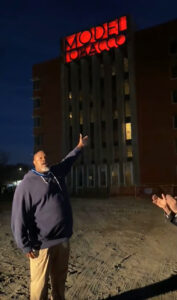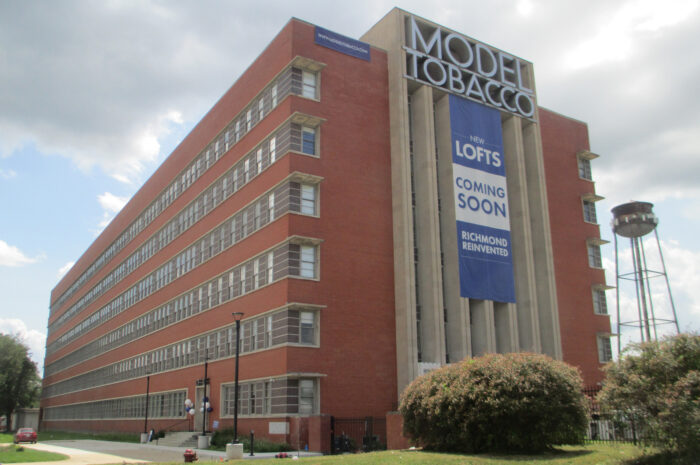A settlement has brought an end to the legal battle between the developer of the Model Tobacco Lofts and two investors in the project.
A federal judge last month dismissed the year-old lawsuit filed against developer Chris Harrison by two investment entities owned by Steven Snider and R. Michael Kuehn. They accused Harrison of committing fraud and money laundering to wrest control of the South Richmond project that converted the old tobacco facility into apartments.
The order from U.S. District Judge David Novak was made in light of a confidential settlement agreement reached between the parties in April. It dismisses all claims with prejudice, meaning they can’t be brought again in federal court. The order required each party to bear its own attorney fees and costs.
Filed in May 2022, the original suit alleged that Harrison, principal of Maryland-based C.A. Harrison Cos., induced investors under false pretenses into putting more than twice the amount of money into the project than they’d originally agreed, then tricked them into changing its management structure with the intention of diluting their interests in the project.

Developer Chris Harrison at a ceremony in 2021 when the building’s signage was illuminated for the first time in decades. (BizSense file)
Harrison filed a countersuit two months later that denied the allegations and argued “that there is risk associated with all investments, including timing for obtaining financing and completion of the project itself.” The countersuit also argued that the case belonged in state court.
Snider and Kuehn alleged that Harrison violated the development group’s operating agreement with multiple financial transactions that required the investors’ approval, misrepresented the project’s readiness and timeline, and ultimately induced them to put $2.2 million more into the project after delays with financing and the property’s closing.
Harrison argued that Snider and Kuehn caused the delays with financing and the property’s closing when they refused to sign guarantees for equity in the project. His counterclaim also said the delay cost the project potential state and federal historic tax credits.
The original lawsuit claimed racketeering, breaches of contract and fraud, and sought Harrison’s dissociation from the development group and award of damages, including nearly $4 million in initial investment and additional capital put into the project. Harrison’s counterclaim alleged breach of contract and sought dissolution of Snider and Kuehn from the group.
Snider and Kuehn were investors in another Harrison project in Washington, D.C., when Harrison approached them about investing in Model Tobacco, according to the suit. Snider is the founder of Snider & Weinstein, a D.C.-based real estate law firm.
Harrison has since completed the first phase of the mixed-use project converting the Art Deco-style building and 15-acre complex along Richmond Highway into 275 income-based apartments. The first phase involved 203 apartments and includes plans for an entertainment venue with a beer garden and restaurant space. Harrison said in 2020 that the phase was estimated to cost about $59 million.
Harrison was represented in the lawsuit by a team from Norfolk law firm Fraim & Fiorella headed up by attorney Todd Fiorella, and by George Doumar of Doumar Martin in Fairfax. Snider and Kuehn were represented the D.C. office of Quinn Emanuel Urquhart & Sullivan headed up by attorney Keith Forst.
Calls to the attorneys and Harrison seeking comment were not returned Wednesday.
The Model Tobacco agreement follows a settlement reached last year between Harrison and the City of Petersburg. That settlement, which resolved litigation from Petersburg, saw Harrison sell back to the city the former Ramada Inn property that was once planned for a $20 million rehab.
Petersburg paid Harrison $1.25 million for the blighted property – $500,000 more than he paid for it four years earlier. The city has since razed the nine-story building, which was highly visible along Interstate 95. The city is seeking to have the 2-acre site at 380 E. Washington St. redeveloped, potentially with another hotel.
A settlement has brought an end to the legal battle between the developer of the Model Tobacco Lofts and two investors in the project.
A federal judge last month dismissed the year-old lawsuit filed against developer Chris Harrison by two investment entities owned by Steven Snider and R. Michael Kuehn. They accused Harrison of committing fraud and money laundering to wrest control of the South Richmond project that converted the old tobacco facility into apartments.
The order from U.S. District Judge David Novak was made in light of a confidential settlement agreement reached between the parties in April. It dismisses all claims with prejudice, meaning they can’t be brought again in federal court. The order required each party to bear its own attorney fees and costs.
Filed in May 2022, the original suit alleged that Harrison, principal of Maryland-based C.A. Harrison Cos., induced investors under false pretenses into putting more than twice the amount of money into the project than they’d originally agreed, then tricked them into changing its management structure with the intention of diluting their interests in the project.

Developer Chris Harrison at a ceremony in 2021 when the building’s signage was illuminated for the first time in decades. (BizSense file)
Harrison filed a countersuit two months later that denied the allegations and argued “that there is risk associated with all investments, including timing for obtaining financing and completion of the project itself.” The countersuit also argued that the case belonged in state court.
Snider and Kuehn alleged that Harrison violated the development group’s operating agreement with multiple financial transactions that required the investors’ approval, misrepresented the project’s readiness and timeline, and ultimately induced them to put $2.2 million more into the project after delays with financing and the property’s closing.
Harrison argued that Snider and Kuehn caused the delays with financing and the property’s closing when they refused to sign guarantees for equity in the project. His counterclaim also said the delay cost the project potential state and federal historic tax credits.
The original lawsuit claimed racketeering, breaches of contract and fraud, and sought Harrison’s dissociation from the development group and award of damages, including nearly $4 million in initial investment and additional capital put into the project. Harrison’s counterclaim alleged breach of contract and sought dissolution of Snider and Kuehn from the group.
Snider and Kuehn were investors in another Harrison project in Washington, D.C., when Harrison approached them about investing in Model Tobacco, according to the suit. Snider is the founder of Snider & Weinstein, a D.C.-based real estate law firm.
Harrison has since completed the first phase of the mixed-use project converting the Art Deco-style building and 15-acre complex along Richmond Highway into 275 income-based apartments. The first phase involved 203 apartments and includes plans for an entertainment venue with a beer garden and restaurant space. Harrison said in 2020 that the phase was estimated to cost about $59 million.
Harrison was represented in the lawsuit by a team from Norfolk law firm Fraim & Fiorella headed up by attorney Todd Fiorella, and by George Doumar of Doumar Martin in Fairfax. Snider and Kuehn were represented the D.C. office of Quinn Emanuel Urquhart & Sullivan headed up by attorney Keith Forst.
Calls to the attorneys and Harrison seeking comment were not returned Wednesday.
The Model Tobacco agreement follows a settlement reached last year between Harrison and the City of Petersburg. That settlement, which resolved litigation from Petersburg, saw Harrison sell back to the city the former Ramada Inn property that was once planned for a $20 million rehab.
Petersburg paid Harrison $1.25 million for the blighted property – $500,000 more than he paid for it four years earlier. The city has since razed the nine-story building, which was highly visible along Interstate 95. The city is seeking to have the 2-acre site at 380 E. Washington St. redeveloped, potentially with another hotel.

It’s a beautiful building and provides a big slug of affordable units. It also stretches the redevelopment frontiers of Manchester further south on Commerce which I’m in favor of. Still, I’d prefer that the City would incentivize developers to provide more affordable units throughout the city boundaries rather than corral them in one site and in specific areas. It would also work in the new redevelopment areas of Henrico and Chesterfield, providing more affordable choices for entering salary level public workers who the municipalities are finding so difficult to recruit. There are solutions available to Richmond, Henrico, and Chesterfield if… Read more »
If this is low income housing, the entertainment venue, beer garden, and restaurant space should be used for more housing. The tenants can go to other places in Manchester for entertainment, beer and food. I am sure that if I am on a waitlist for low income housing, I would rather a developer and the city put their efforts into the housing – not the entertainment venue. From the map, it looks like a food desert. The developer should consider encouraging a grocery store to move in?
Income based does not mean solely low-income. I think the entertainment, beer and food is fine for this development. This area could use all the job creation it can get. People of all income levels need places to eat, drink and be entertained. Besides, someone keeps telling me that Manchester has too much traffic and not enough parking.
LOL!
Hey now, I resemble that remark……ha!
Maybe you are correct, maybe not, about a venue —- to me, this should be more about the developer’s even this ones’ needs, not the city’s low income residents. But incentivizing a grocery is NOT easy — I have known developers who wanted to put one in as an amenity and they couldn’t make the business case. Basically, groceries are such a low margin business that the risks are high and the potential rewards are low. Therefore, a supermarket or whatever has to ALREADY want to move in the space, or an similar one and some incentive can then tip… Read more »
They probably had to settle this rather than go to trial because it jeopardized the tax credits. The lenders stepped in and explained to the parties they needed to come to an agreement otherwise they would foreclose and hand everything over to some one else. Just a speculative observation